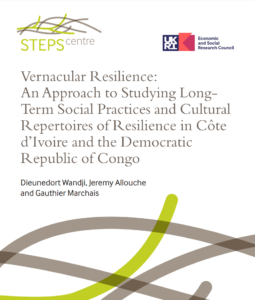A French version of this paper is also available.
This working paper aims to situate our research project within the various debates around resilience. It advocates a historical, cultural and plural approach to understanding how communities develop and share resilient practices in contexts of multiple and protracted crises. A focus on ‘vernacular’ resilience, as embedded in social practices and cultural repertoires, is important since conventional approaches to resilience seem to have overloo ked how locally embedded forms of resilience are socially constructed historically.
ked how locally embedded forms of resilience are socially constructed historically.
Our approach results from a combination of two observations. Firstly, conventional approaches to resilience in development, humanitarian and peace studies carry the limitations of their own epistemic assumptions – notably the fact that they have generic conceptions of what constitutes resilience. Secondly, these approaches are often ahistorical and neglect the temporal and intergenerational dimensions of repertoires of resilience. In addition to observable social practices, culture and history are crucial in understanding the ways in which vernacular and networked knowledge operates.